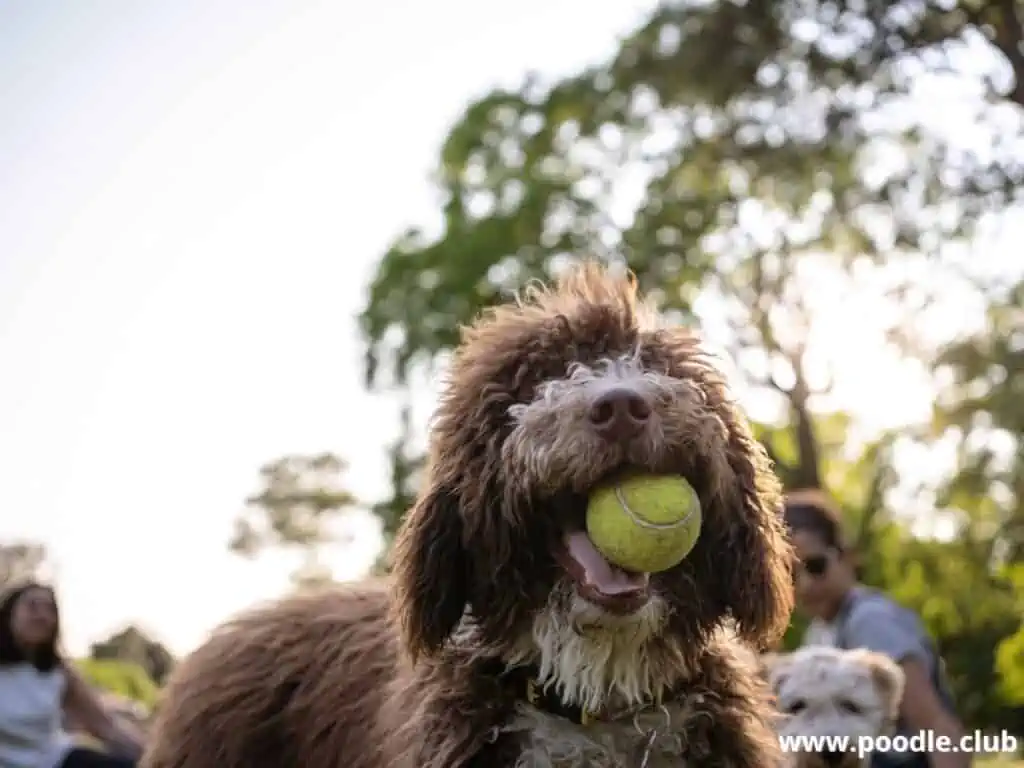How to Socialize Labradoodles? Effective Tips for a Happy Pup
Labradoodles are known for their friendly and gentle nature, making them excellent companions and family pets. To ensure that these intelligent, sociable dogs reach their full potential and maintain their wonderful temperament, it’s vital to invest time in properly socializing them. By doing so, you’ll establish a strong bond with your furry friend and give them the confidence to be on their best behavior at all times.
Socializing a Labradoodle can seem daunting at first, but by breaking the process down into manageable steps, you can effectively teach your pup key socialization skills. It’s all about patience, consistency, and understanding your dog’s unique needs. From introducing them to new experiences to addressing potential health and behavioural issues, proper socialization can shape your Labradoodle into a well-rounded and stable adult dog.

Key Takeaways
- Properly socialize your Labradoodle for a happy and well-rounded pet.
- Invest time in understanding your dog’s unique needs and teach key socialization skills.
- Introduce your pup to new experiences while addressing potential health and behavioural issues.
Understanding Labradoodles
When looking into socializing your Labradoodle, it’s important to first understand their unique breed characteristics. A Labradoodle is a crossbreed between a Labrador Retriever and a Poodle, which are originally Australian.

One of the key features of Labradoodles is their high level of intelligence, making them very trainable. Due to their Poodle heritage, they tend to have a low-shedding coat, which makes them more hypoallergenic than some other breeds. They do, however, still shed allergens, so it’s essential to be aware of this if you have allergy concerns.
Labradoodles are a relatively healthy breed, but, like any dog, they can be prone to certain health problems. Some common issues to watch for include hip dysplasia and progressive retinal atrophy.
As for their size, Labradoodles can vary greatly due to the mix of genetics from both Labrador Retrievers and Poodles. Typically, their weight can range from 50 to 65 pounds, while their height can span between 22 and 24 inches.
Their temperament is generally friendly and energetic, making them excellent companions and family pets. Since they are a high-energy breed, it’s important to provide them with plenty of physical and mental stimulation.
When it comes to socializing, the personalities of individual Labradoodles can vary, but their innate intelligence and eagerness to learn make them very receptive to training. To provide your Labradoodle with a well-rounded and positive experience, consider the following tips:
- Begin socialization early on in your Labradoodle’s life.
- Expose them to a variety of people, environments, and other animals.
- Enroll in a training class for additional guidance and support.
- Be patient, calm, and consistent during the process.
By better understanding your Labradoodle’s background and unique breed characteristics, you’ll be better equipped to socialize them and foster a strong, confident, and well-adjusted companion.
Essential Steps in Socializing Labradoodles

Health Checks
Before you begin socializing your Labradoodle, it’s important to ensure they are healthy and up-to-date with vaccinations. Consult your veterinarian for a thorough health check and discuss the appropriate vaccination schedule. A healthy dog is more likely to have a positive socialization experience and be comfortable in different environments.
PuppySpot is a reputable dog marketplace where you can browse and find compatible puppies right from the comfort of your home. They have placed over 200,000 puppies into homes in the US!
Providing Positive Experiences
To help your Labradoodle become a confident and well-adjusted adult, you should expose them to a variety of people, animals, and environments during socialization. Be consistent in providing positive experiences:
- New environments: Take your dog to different locations such as parks, pet stores, and outdoor cafes.
- People and children: Introduce them to individuals of various ages, sizes, and ethnicities to develop their comfort around diverse people.
- Other animals: Allow supervised interactions with other dogs and animals, ensuring all parties are comfortable.
Remember to keep your Labradoodle on a leash during introductions, and use treats or toys to reward them for displaying calm and friendly behavior.
Gradual Introduction
Take a gradual approach to socializing your Labradoodle by initially exposing them to less challenging situations. As their confidence grows, gradually introduce more complex and stimulating environments:
- Begin at home: Start by inviting friends and their well-behaved pets to your home under close supervision.
- Join a socialization class: Enroll your Labradoodle in a training class or puppy socialization group with a skilled trainer.
- Explore public areas: When your dog is ready, venture to public areas for more diverse introductions.
During each phase, pay close attention to your Labradoodle’s body language and behavior. If they show signs of fear or discomfort, take a step back and allow them time to adjust before reintroducing the situation.
Following these essential steps will help your Labradoodle develop into a sociable, confident, and well-adjusted adult who can enjoy various environments and situations.
Training Techniques for Socialization
As a Labradoodle owner, it’s crucial to help your dog become well-socialized. Start by focusing on training techniques that encourage positive interactions with both humans and other dogs. Remember to be confident and clear with your instructions, as Labradoodles are easy to train when communication is consistent.

One effective training method is positive reinforcement. This involves rewarding your Labradoodle with treats, praise, and playtime whenever they successfully follow a command. Obedience training should start during the puppy stage, as this helps lay a solid foundation for good behavior and trust.
Crate training can also assist with house training and provide your dog with a safe space to retreat to when overwhelmed.
When teaching new commands, be patient and use simple words. Labradoodles are quick learners, so consistent practice, coupled with plenty of rewards, will yield positive results. Some basic commands to start with include:
- Sit
- Stay
- Come
- Down
Exercising your Labradoodle regularly is essential for their physical health and socialization. Scheduling playdates and frequent visits to dog parks expose your pet to different environments and interactions. This exposure helps your Labradoodle develop an affinity towards social situations while maintaining a neutral and calm demeanor.
Lastly, avoid using punishment or harsh reprimands during training. These methods can lead to a timid or fearful dog, hindering the socialization process. Instead, focus on building trust and understanding between you and your Labradoodle; this will strengthen your bond and keep your dog eager to learn and socialize with others.
Addressing Common Health and Behavioural Issues
When socializing your Labradoodle, it’s essential to be aware of common health and behavioural issues to ensure their well-being. A well-mannered and healthy Labradoodle will be more receptive to meeting new people and pets.

Anxiety and Aggression: Some Labradoodles may experience anxiety, which can lead to aggression. It’s crucial to introduce new experiences gradually to your Labradoodle. Make sure each interaction is positive and rewarding.
If aggression persists, consult a veterinarian or a professional trainer for guidance.
Diet and Health Issues: A balanced diet is key to maintaining your Labradoodle’s overall health. Improper diet can result in shedding, weight gain, and other health problems. Consult with your veterinarian to establish an appropriate diet and be attentive to any changes in your Labradoodle’s health.
Bad Habits and Training: Address any bad habits your Labradoodle may develop during socialization. Encourage good behaviour through positive reinforcement, and be firm when correcting unwanted actions. Consistency is crucial for effective training.
Grooming and Shedding: To reduce shedding and maintain your Labradoodle’s coat, establish a regular grooming routine. Brush their coat at least once a week, and schedule professional grooming as needed. This will ensure your Labradoodle is comfortable and looking their best during socialization.
Energetic Nature: Labradoodles are known for their energetic personalities. Ensuring your Labradoodle gets the proper amount of exercise can help prevent destructive behaviours and improve their overall attitude during socialization. Incorporate regular walks and playtime into your daily routine.
By addressing these common health and behavioural issues, your Labradoodle will be better equipped for successful socialization. Don’t hesitate to consult your veterinarian with any concerns or questions along the way.


![How To Stop A Dog From Howling [Guide]](https://poodle.club/wp-content/uploads/2023/08/how-to-stop-dogs-from-howling-768x512.webp)




